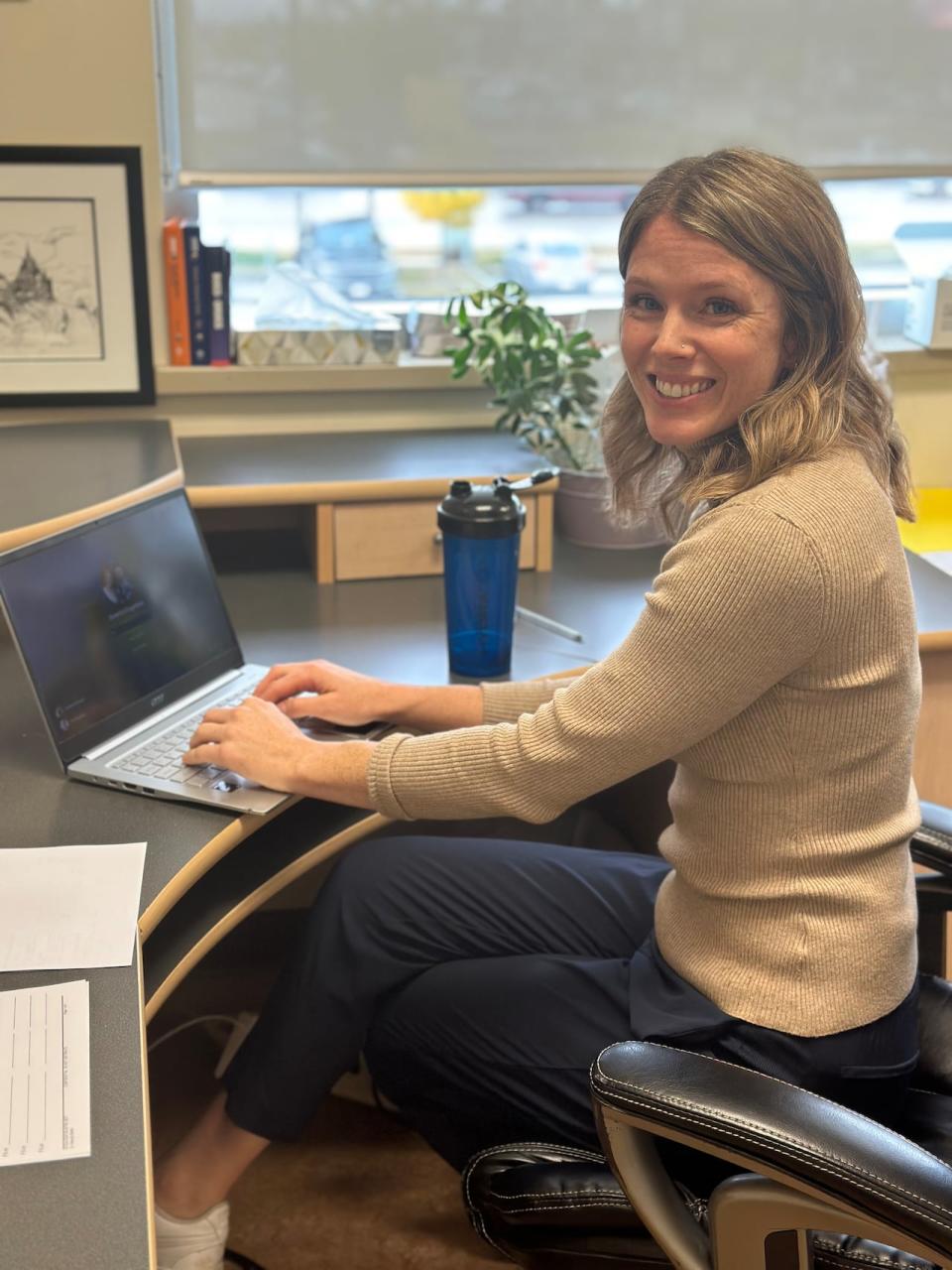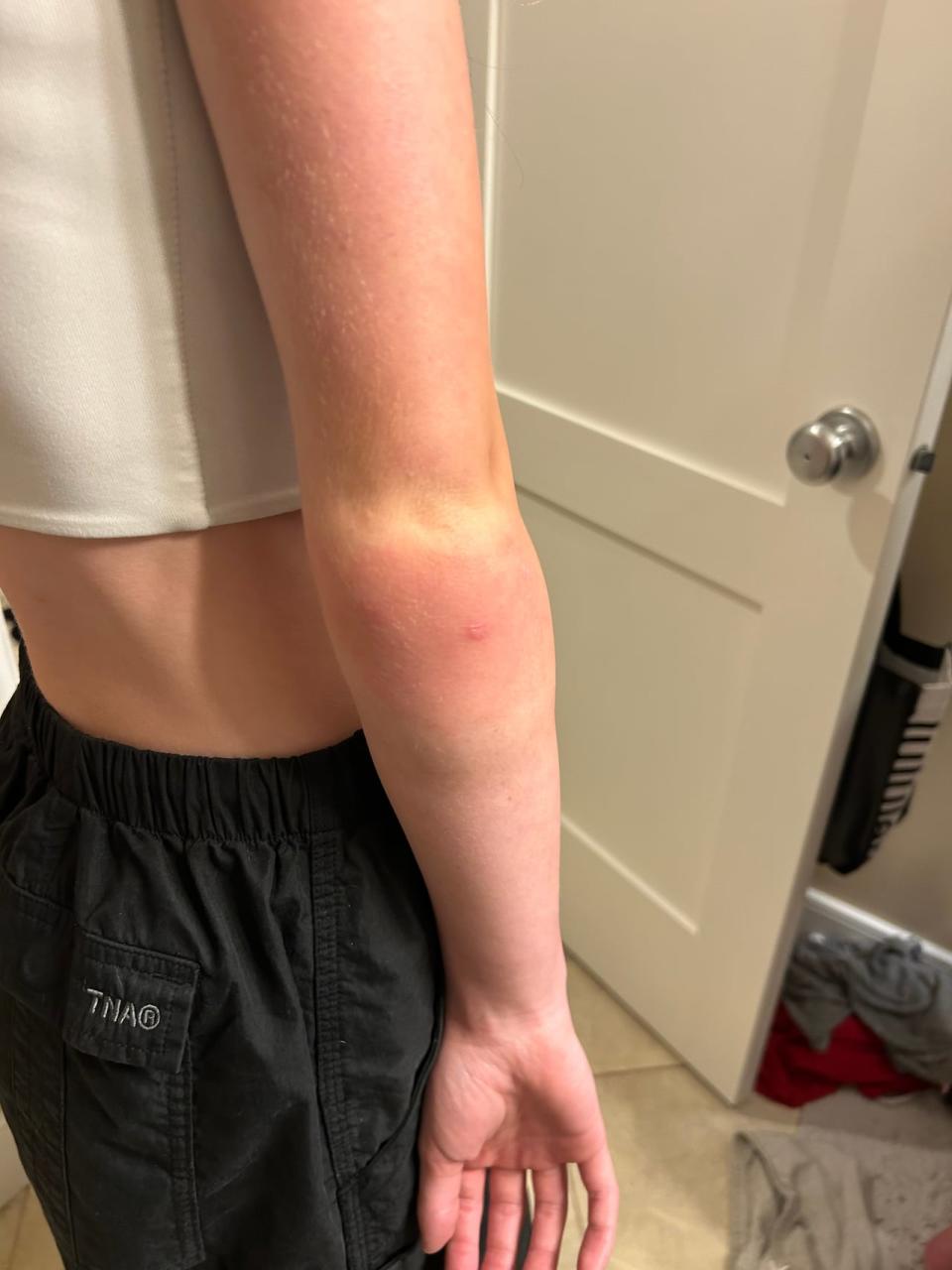
Dr. Genelle Dingeldein and her team of doctors with 811 Health Link are able to see patients with urgent needs by Zoom call. (Submitted by Genelle Dingeldein)
Sarah Duncan thought her daughter’s elbow might be broken.
The teenager had been playing volleyball and diving on the hard gym floor. Now the arm was stiff and swollen, but with a strange red mark.
Duncan couldn’t check with her family doctor because it was Saturday. She didn’t think she needed to visit the emergency, and she generally avoided calling 811 because phone conversations with the nurses had not been helpful in the past.
Still, she tried again and was taken by surprise — they gave her a virtual appointment with a real doctor.
“811 worked out perfectly,” she said afterward. “The nurse when we first called 811 and the doctor were incredibly reassuring.… The turnaround was super fast. I would say probably within an hour to an hour and a half, we were completed with the doctor.”
Since 2015, Albertans have been able to dial three digits, 8-1-1, to get connected to nurses and some other medical specialists for advice. Then in 2022, Alberta Health Services added family doctors to the roster specifically to help with COVID-19 patients.


When Sarah Duncan saw her daughter’s elbow, it was stiff, swollen and rock hard. She thought it might have been broken during a recent volleyball game. (Submitted by Sarah Duncan)
Dr. Genelle Dingeldein is the medical director for Health Link. She says that pilot project was successful and helped patients who needed urgent but not emergency care. So it expanded and is now offered to many patients who are told they should see a doctor to check out their symptoms within four to 24 hours.
“It’s for those in-between patients,” she said, when reached at her home in Grande Prairie.
“People are triaged by our nurses. People who need to go to the emergency room right now or to hang up and call 911 are still given that advice.
“And if you’re told you should see a doctor within the next three days, usually people have some options to do that. But four hours, it’s difficult to access (help) in that time in the community.”
Dingeldein says 88 family and emergency room doctors from across the province have signed up to help. They mostly have other practices and take these shifts on the side, sometimes working from home. At least one doctor is available at all times from 6 a.m to 2 a.m.
The doctors talk with patients by phone or on Zoom, and can order tests or send a prescription to a pharmacy. And starting in November, the visit and findings will go into Connect Care, the province’s new patient health tracking system.
Dingeldein says it gives people options, especially if they live in rural areas or have other transportation problems, or if they don’t have a family doctor.
For Duncan, when the doctor called to check on her daughter Natalie’s elbow, they quickly switched to Zoom so he could see it. He soon decided it was not broken but could be a bug bite.
He told them to wait and see if it got better, and to follow up with her family doctor if it didn’t. They did not need to visit an emergency department.
Since the pandemic, Albertans have had access to more virtual care. Family doctors and specialists sometimes offer their patients the options of a video or phone call. There are also private services such as Telus Health or Maple. But there are critics of this trend as well.
These kinds of services are our response to the fact that we don’t have a strong primary care system. – Dr. Braden Manns
Dr. Braden Manns is a professor of medicine at the University of Calgary and also a kidney doctor. He sometimes offers his patients virtual care to save them a trip across town. But he says it’s important that he gets to know them first, that they are set up to take their own blood pressure, and that he never goes too long without seeing them in person.
He says the virtual care offered in programs such as 811 Health Link are an imperfect answer to a much bigger problem.
“These kinds of services are our response to the fact that we don’t have a strong primary care system, and that we have huge problems with overcrowding in our emergency departments,” he said.
But it really does help with the semi-urgent cases, he added.
“If you get told you should be seen in the next day, it is a small proportion of Canadians, Albertans included, that can actually get in to see their family doctor,” he said. “It’s probably less than 20 per cent. So you’re either telling them to go to emergency or to a walk-in clinic, which might not be open.”
This virtual care adds options.
But in general, virtual care from a stranger is not the same as in-person care from a person’s own doctor, he said. And he pointed to an Ontario study that found patients who booked a visit with a previously unknown virtual doctor were more likely to visit emergency afterward than those who booked virtual visits with their own family physicians.


Dr. Braden Manns is a nephrologist and professor of medicine at the University of Calgary. He says programs such as 811 Health Link are an imperfect answer to a much bigger problem. (Submitted by Braden Manns)
Dingeldein said her team is careful about which patients they take on.
“We do a lot of infectious presentation, so gastroenteritis, vomiting, diarrhea. We can do a pretty good hydration assessment virtually. And coughs and colds, fevers, rashes and those sorts of things, swelling.”
“Things that we tend to exclude? We don’t see babies under three months of age. We feel they need to be seen in person just because of their risk for certain things. We also don’t do anything that might require a sensitive exam. [Anything under a bikini].
“Additionally, if it’s something that clearly needs some type of diagnostics or like sutures (stitches) or that sort of thing or an X-ray, we know that we’re not doing those things virtually. So they would be directed toward in-person care by the nursing team.”
She said they see about 110 patients a day, which is still a small percentage of everyone calling 811. But they also take some calls that are redirected when people call 911. And they still help out with COVID-19 patients who are immunocompromised and need drugs like Paxlovid in the community.
“I would say always call because, you know, we are always here,” she added. “In the North zone and in the rural areas — we don’t see as high call volumes even per capita in those areas — we can help fill in some of those gaps.
“I would just encourage people, if you’re thinking about it, to call.”

